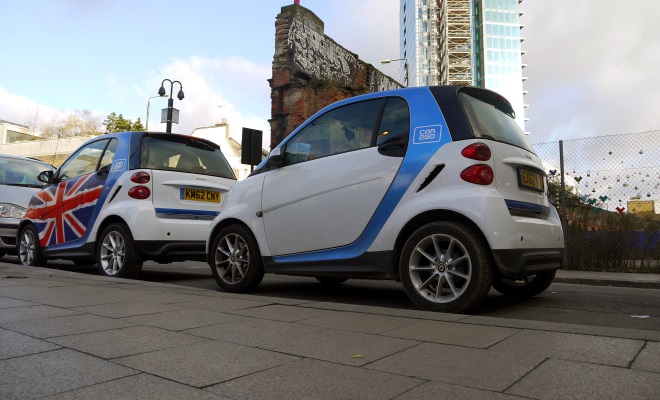
Cars might be built for speed but most spend an inordinate amount of time sitting still. On average, a British car spends 96% of its life parked and only the remaining 4% actually going places. And the trend is downward – average mileages have fallen below 8,500 miles per year from around 10,000 miles a couple of decades ago, as congestion takes its toll and more and more households own a second car.
The people who plan our roads and cities are well aware of these figures, given the need to provide parking for all that stationary metal at the kerbside. Which is one reason why many local authorities are starting to think seriously about promoting car sharing. If cars were busy for more the time, there wouldn’t need to be so many of them, easing parking pressure and yielding more space for buses, bicycles, trams and pavements.
There are already a number of car-sharing organisations in the UK, the largest of which is Zipcar. It swallowed its former rival Streetcar in 2010 and now boasts 1,500 cars across the UK, scattered throughout the urban areas of London, Bristol, Oxford, Cambridge, Kent and Surrey.
The Zipcar notion is that a shared car will be available within easy distance of each member’s home, thus providing some of the benefits of car ownership without all the biggest costs and hassles – no commitment, no depreciation, no servicing, no MoTs, etc, etc.

Zipcar members book the cars online or over the telephone, unlock them with a smartcard, and pay an hourly rate that covers fuel, insurance, carwash costs and other fees like the congestion charge. Members remain responsible for any fines or parking tickets of course, and may face additional charges for excessive dirt or damage.
That last issue – responsibility for damage – brings the most contentious variable to the whole car-sharing equation. Wayward supermarket trolleys, vandals, and other drivers prepared to scrape and scarper all mean there may be no such thing as a simple dent. Zipcar reserves the right to charge members up to £750 for damage, a sum sufficiently wince-inducing to trigger the launch of car club excess insurance. As the comments on my Zipcar review from a few years ago prove, not every customer has been left satisfied by Zipcar’s approach.
There is clearly room for competition in car sharing, so I was delighted to spot this pair of cheeky little Smart cars hanging around in Shoreditch, just waiting to be hired. They are two of the 200-odd Smart ForTwos that have arrived in London with the launch of Car2go, a car-sharing service backed by Smart parent company Daimler and rental firm Europcar.

While the tiny Smart is not as practical as any Zipcar – despite Car2go’s bizarre claim that you might take a tumble dryer home in one – the £500 insurance excess is helpfully smaller as well.
A bigger difference is that Car2go cars are intended for more sporadic and spontaneous use. While members can book a Zipcar rental months in advance, Car2go vehicles can’t be reserved until half an hour beforehand. And if a Car2go vehicle hasn’t been reserved, a member can simply unlock it with their smartcard and drive away.
Ordinary running costs sound reasonable – joining is free and using the cars costs 35p per minute. Members signing up before the end of the month even get 30 minutes credit on their account.
Another difference is that each Zipcar has a home parking bay, to which it must be returned at the end of each use. This is great if your journey is a there-and-back-again jaunt, but is generally not so peachy otherwise. Car2go sessions, on the other hand, can be one-way so long as the car winds up still within its “home area” – presumably the same borough in which you started. As long as you leave it parked in a borough-owned bay, all will be well. The Car2go website employs wireless technology to keep track of where each available car is currently sitting, making it simple for members to find the nearest vacant example via smartphone.
If it takes off, Car2go could be a really useful addition to London’s transport mix – much like Boris bikes but without all the sweat and the swearing. The snag, for the moment, is that only three London boroughs are participating – Islington, just north of the City, Newham to the East, and Sutton (which apparently is somewhere south of the river).

skip to main |
skip to sidebar
Most Popular
-
Mercedes-Benz C 220 CDI review – Executive SE edition
-
Audi A1 and A3 to get half an engine
-
Range Rover Evoque review – eD4 and SD4 editions
-
Mild-mannered hybrid: Kia Sportage 48V driven
-
Rising star: Mercedes C220 BlueTec review
-
Lexus GS 450h review
-
Renault Scenic versus Citroen C4 Picasso
-
Family values: Kia Ceed version 3 reviewed
Browse by Brand
Most Recent
 © 2005 to GreenMotor.co.uk | Contact | Terms & Conditions | Cookies | Privacy | Powered by
© 2005 to GreenMotor.co.uk | Contact | Terms & Conditions | Cookies | Privacy | Powered by  | Close
| Close

